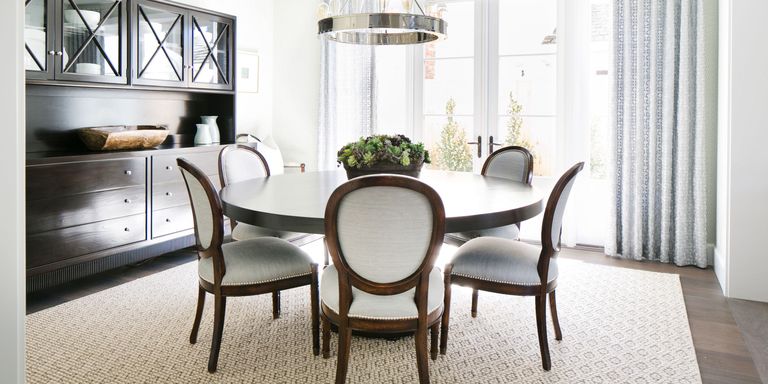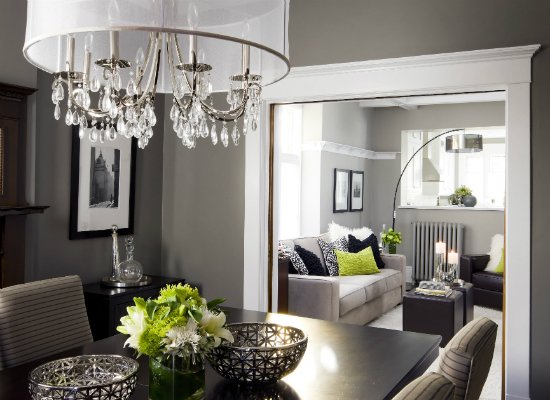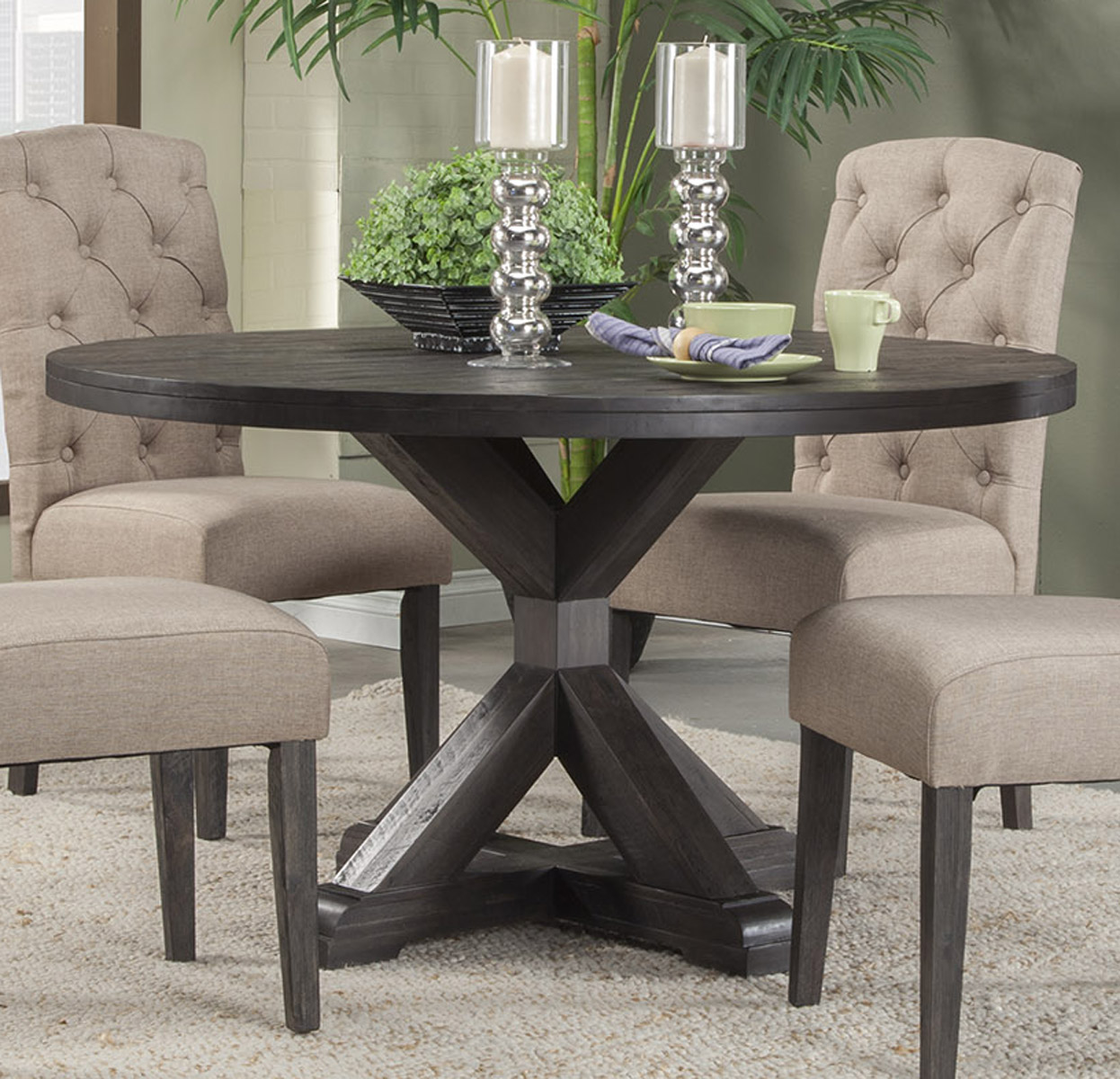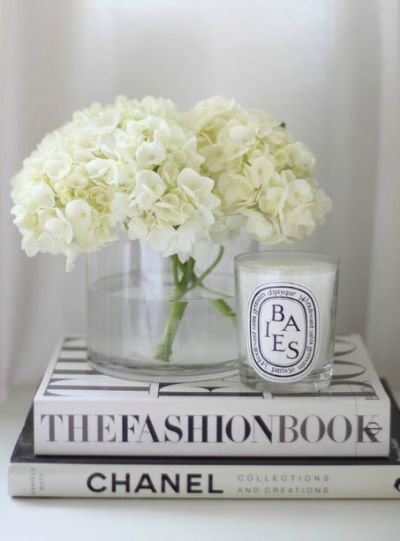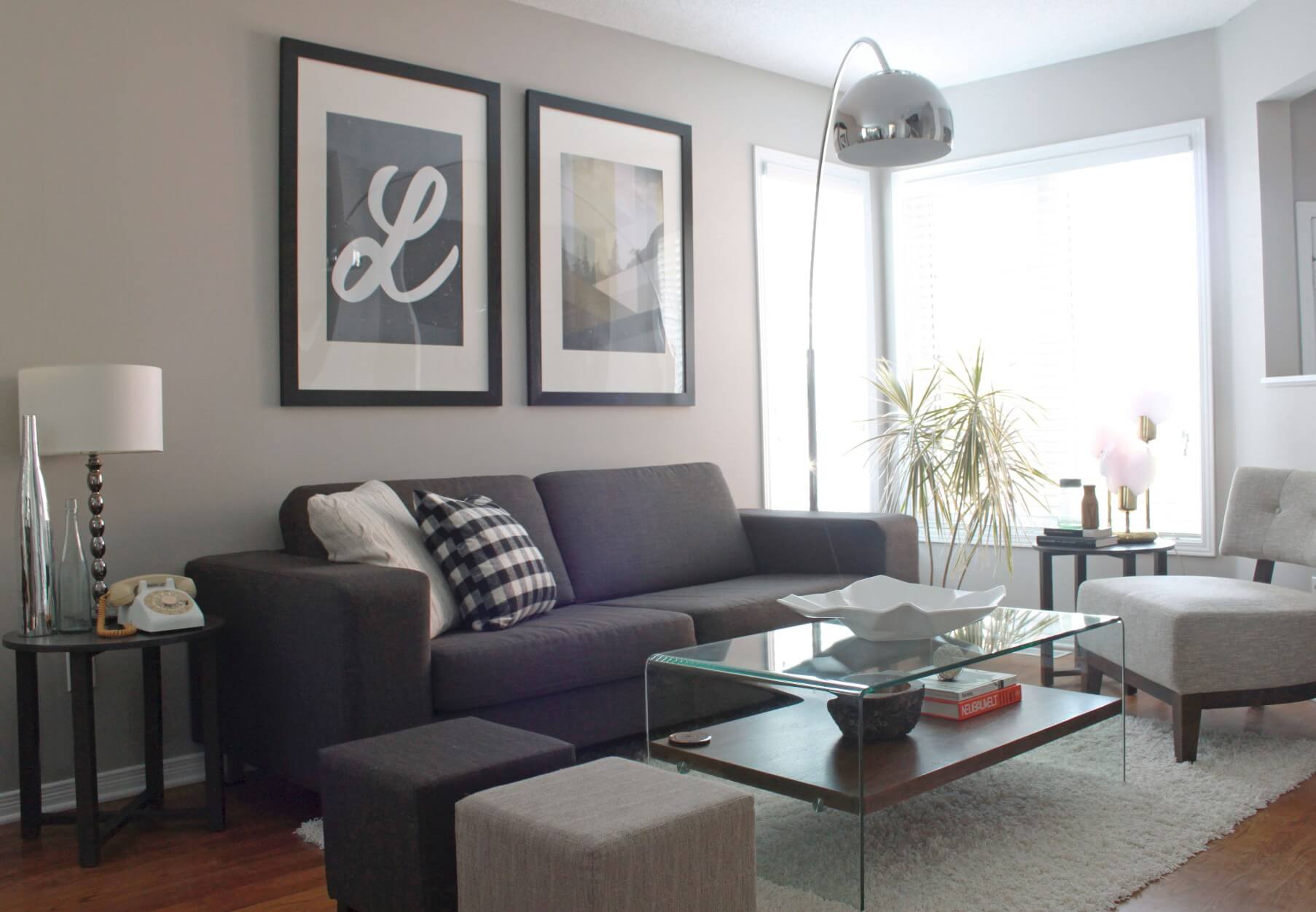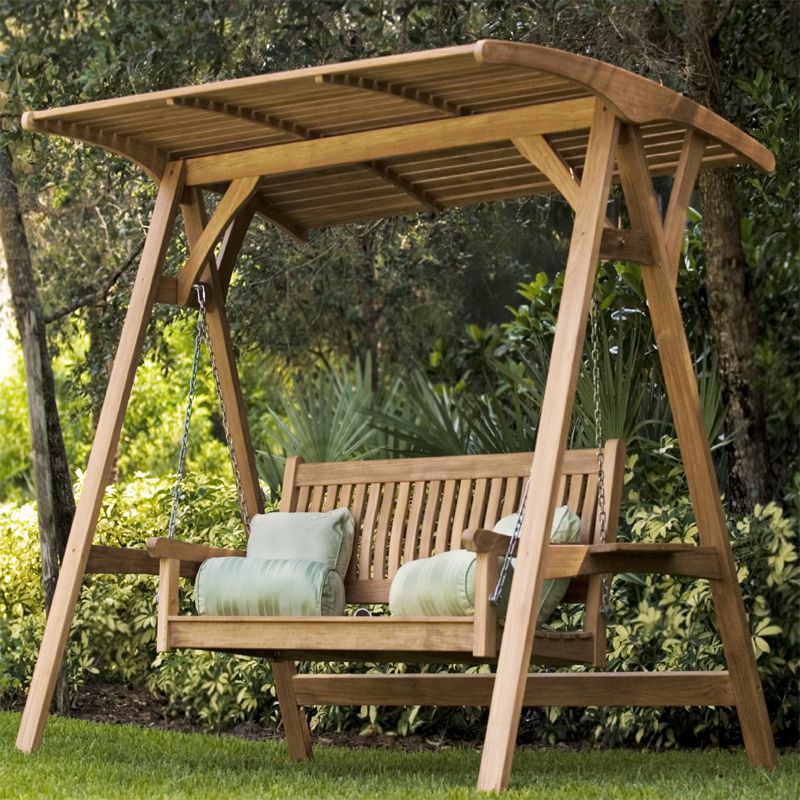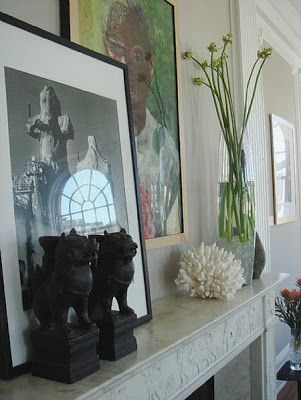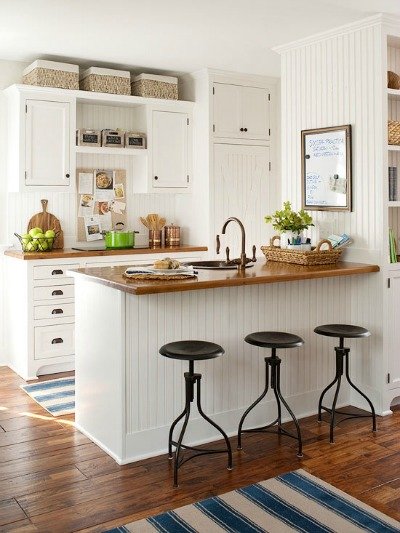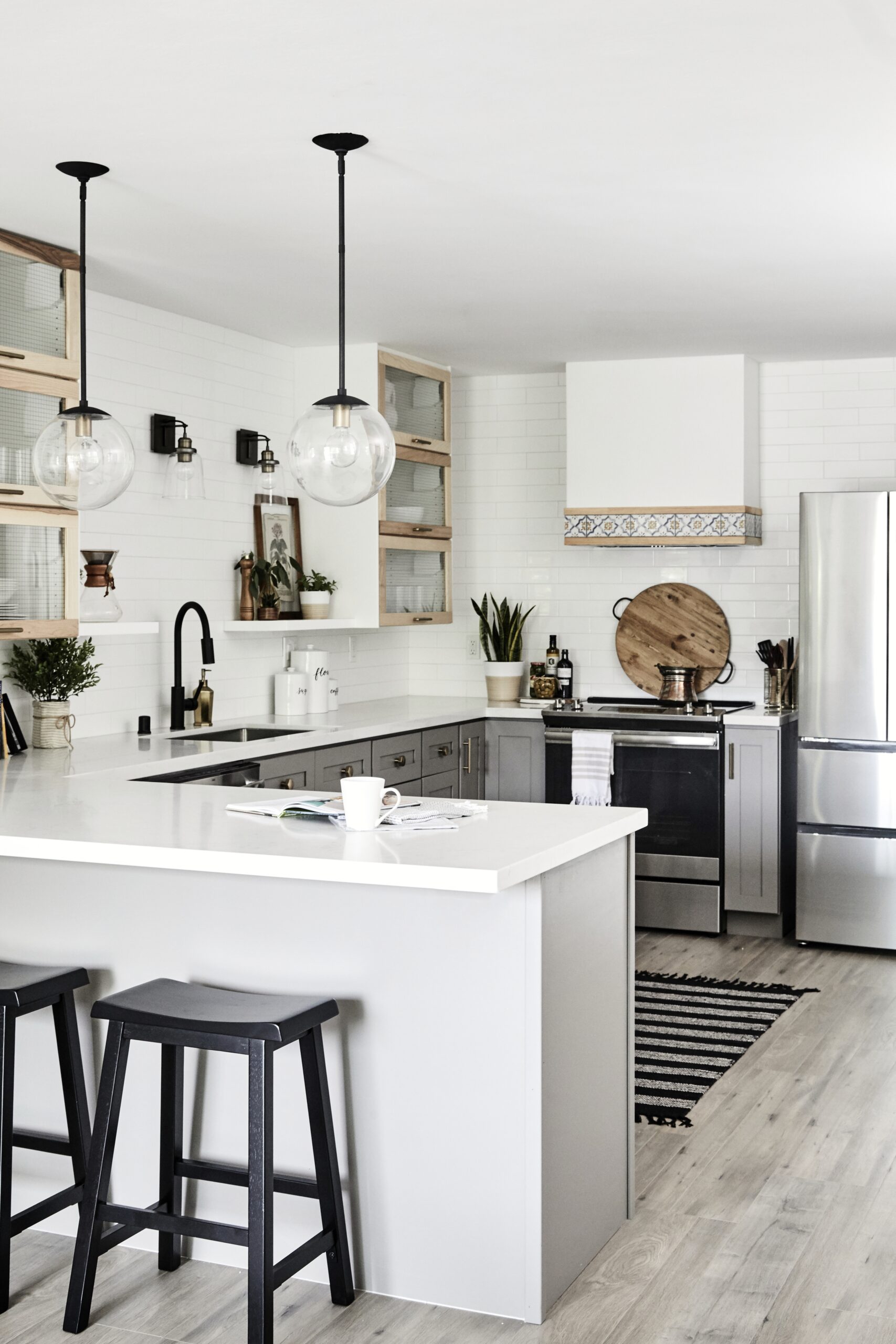Staging the Dining Room
For a faster, more profitable home sale
Staging the dining room before placing your home on the real estate market will make it easier for home buyers to see themselves living and entertaining in your home.
Buyers are looking for a dining area that will accommodate their furniture and lifestyle.
Read the home staging tips and tricks below to learn how you can make your dining room look more spacious, inviting and a comfortable place to linger after a meal.
Is it okay to have dark wall colors in a dining room?
Yes, absolutely! The dining room is one area where you can go dark or bold with your color choice. Bedrooms and powder rooms are other options for dark colors, but that's a topic for another page.
A dark wall color can generate a cozy, intimate feel. Imagine dining by candlelight or with lights dimmed to low.
Beware the color red. While a red dining room was a popular trend for many years, not everyone will love it and will only be thinking of all the repainting they'll have to do.
If you intend to sell your house, I recommend that you tone down any particularly bold or taste specific color. Rather, select a darker neutral shade of the adjacent room for good color flow.
For a list of tips that will maximize your home's appeal, check out this list of improvements for a successful sale.
Create a focal point in the dining room
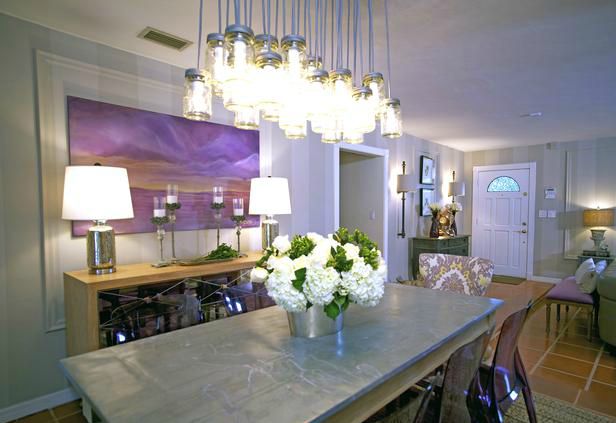 This open space dining area has multiple focal points--table with floral centerpiece, lavender painting and chandelier. Photo source unknown.
This open space dining area has multiple focal points--table with floral centerpiece, lavender painting and chandelier. Photo source unknown.Do you really need a focal point in a dining room? Yes, in fact, every room should have a focal point that immediately draws the eye as you enter a room.
A dining table, simply by virtue of its size, is a natural focal point. Place a centerpiece on the table and there you have it!
You can choose from a range of dining tables, so finding the ideal one for your dining room shouldn’t be difficult. The size of the dining room can help you decide on the dining table size you should get. You can even get an extendable dining table if you have a larger room and want to create a striking focal point.
If you have a large dining room, take advantage of the extra space by placing a large piece of furniture, like a buffet, against a wall. Create a vignette on the surface and hang or lean a canvas or a mirror at the back.
For a dramatic and elegant focal point, frame a large window with ceiling to floor draperies.
For a small dining room, hang a mirror where it'll reflect light from a chandelier or window. This will bring added depth into the room, making it feel more spacious.
Dining room furniture placement
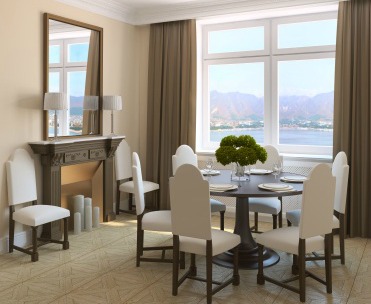 This table feels crowded. Edit out two chairs from around the table to make the room feel more spacious.
This table feels crowded. Edit out two chairs from around the table to make the room feel more spacious.You'd be surprised by the number of people who judge a house by the condition or style of the furnishings.
If your dining room furniture is well-used or taste specific, (heavily ornate or starkly modern) you might consider renting furniture or borrowing from a friend while your home is on the market.
Staging the dining room with neutral-colored furniture will help your dining room appeal to a larger number of buyers, because neutral colors appeal to most people and both sexes.
Add pops of color in the draperies, accessories, vignettes, chair cushions or area rug.
If you plan on using an area rug under the table, bring it in first and center it under the chandelier, if you have one.
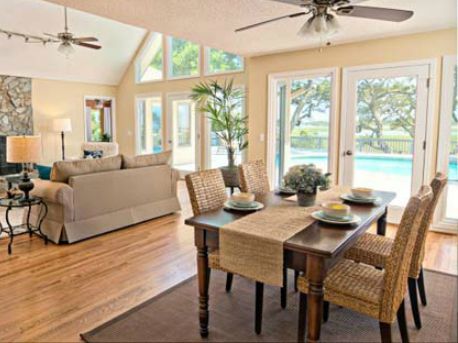 Center the dining table on a large area rug directly under the light fixture to define the dining room.
Center the dining table on a large area rug directly under the light fixture to define the dining room.- A large area rug is essential if you have an open-concept living area, because it'll define that part of the room as the dining space.
- Bring in the table next and center it under the light fixture and on top of the area rug.
- If your dining room is small, stage with no more than four dining chairs, as an abundance of chairs will make a room look crowded.
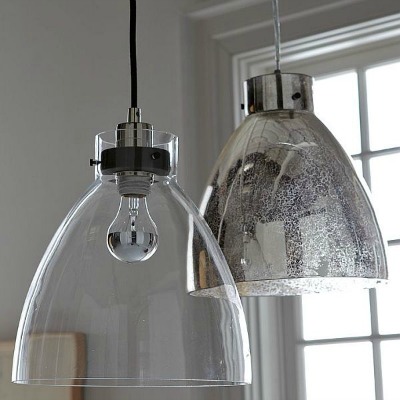 Hanging transparent light fixtures will extend sight lines in a small space.
Hanging transparent light fixtures will extend sight lines in a small space.- Push chairs in to create maximum traffic flow around the table.
- If your dining room is large and oblong, the table may need to go closer to one end of the room. Balance the room by placing something of equal "visual weight" on the opposite side of the room, like a buffet table or armoire.
- For an open concept design space, place the table under the chandelier. If you don’t have a chandelier, place the table in the center of the room.
- For a small dining space, consider replacing a heavy, opaque light fixture with one that has transparent features. This will help extend sight lines, making the room feel larger.
- If your chandelier fixture is not in the right spot for the table, swag it over to the perfect spot. Swagging a chandelier will actually look better then placing a dining table off center, which can make a room look askew.
Watch the video below by Godking333 to learn how to swag your chandelier to the center.
If your table doesn't fit or just looks wrong, a round dining table is often the answer to an awkward or super small dining space.
If your dining chairs have soiled or outdated fabric cushions, try replacing them yourself with neutral-colored fabrics in a solid, stripe, or soft geometric pattern.
Watch the video below to see how easy it is to do it yourself! Video by Sailrite1.
Be sure that the traffic area around the table and chairs is wide enough for two people to walk through at the same time.
Moving out a china hutch or buffet table will instantly make a small dining room look larger. Bulky furniture in a small dining room will diminish the space, making it feel cramped.
Dining room table decor ideas
What is the decor style of your home? Is it formal or casual?
Take a cue from the architecture of your home and stage your dining room table in a fashion that reflects that style.
- Use a tablecloth to hide a less-than-perfect dining table. A tablecloth will immediately change the tenor of a room, festive or formal, depending on the color or pattern you introduce.
- Vary table cloth colors according to the seasons and holidays.
- For a formal look, stage the table with your best dinnerware, silverware, glassware and cloth napkins. Set as you would for an elegant dinner, not a typical family meal. You need set only two places.
- For a casual, relaxing feel, keep tabletop accessories sparse; one large potted plant with colorful blossoms; a linen table runner with a few well placed vases or jars; large candles placed in clear glass containers, etc.
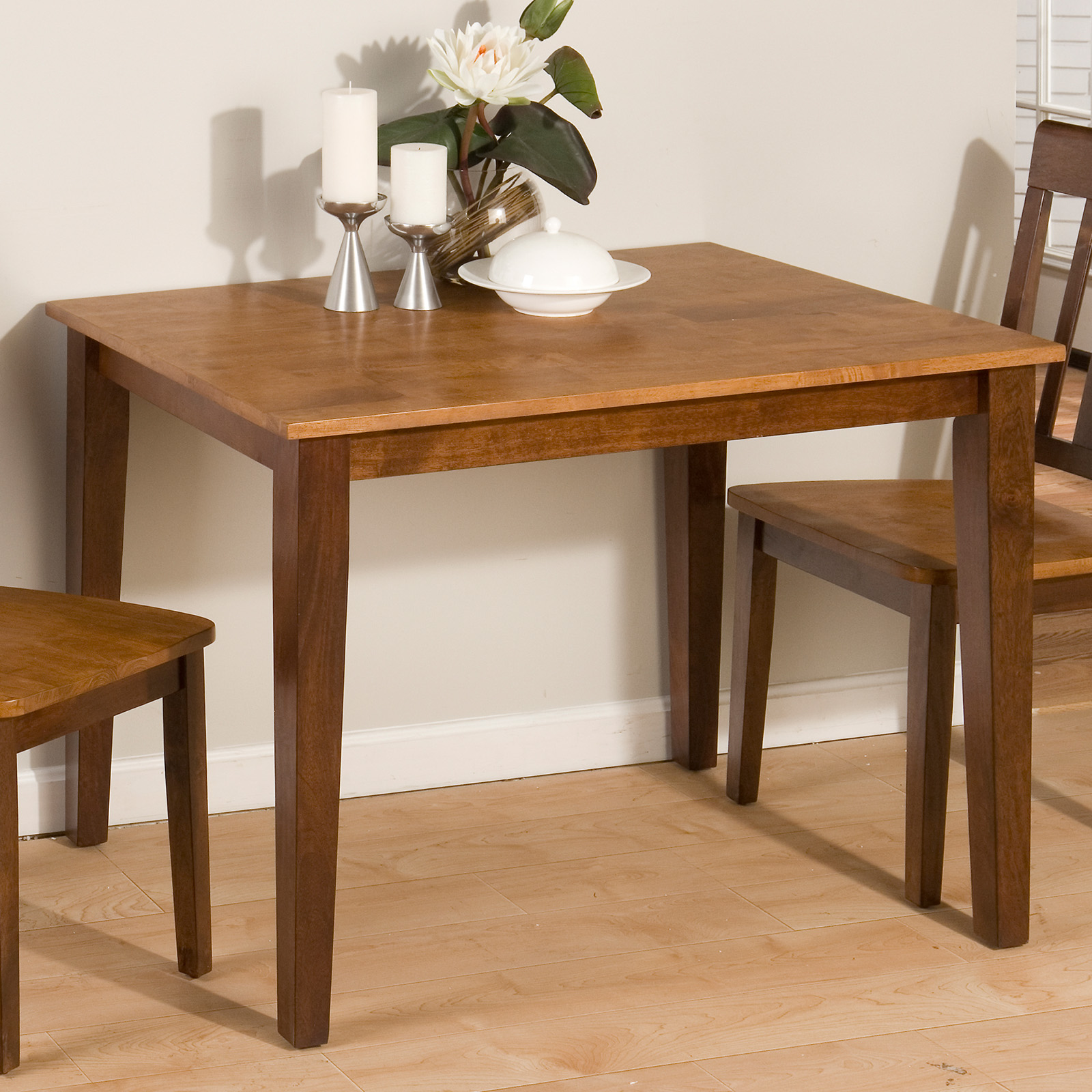 For a super small dining area, remove most of the chairs and place a simple, but elegant arrangement on the table.
For a super small dining area, remove most of the chairs and place a simple, but elegant arrangement on the table.- Create a lifestyle vignette with a bottle of wine, two pretty wine glasses and a loaf of crusty bread on an attractive breadboard.
- Fill a bowl with luscious, cascading grapes.
- Lay out a table runner down the center of the table and place an arrangement of flowers, a bowl of lemons, limes or oranges in the center.
- Set out an array of large pillar style candles down the center of the table.
- If you're having an open house viewing, set the table according to the meal that would be served at that time of day. For instance, a luncheon setting would look more casual than an evening meal.
Watch this video by John Mangano from HomeStagingChannel for great tips on staging your dining room and setting a beautiful table.
Watch the video below for ideas on making beautiful arrangements for your dining room or outdoor dining area. Video by PotteryBarn.
Final touches for the dining room
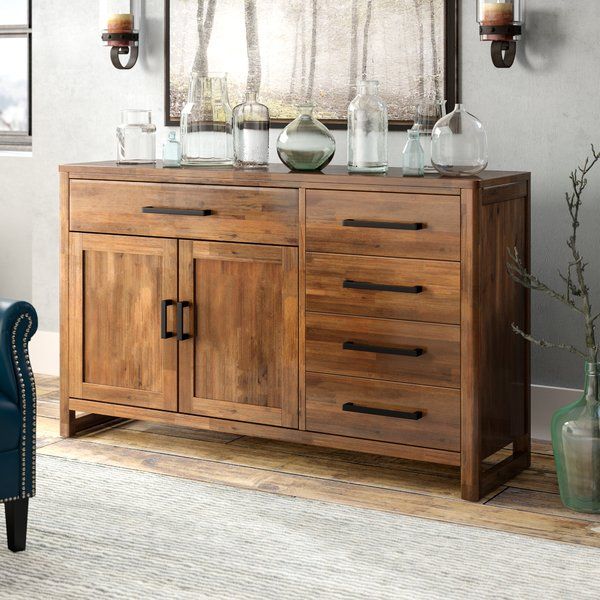 The use of transparent glass decorative objects creates a light, airy feeling of more space. Photo by decorpad.com.
The use of transparent glass decorative objects creates a light, airy feeling of more space. Photo by decorpad.com.Move in a buffet, china hutch, or other large piece of furniture ONLY if you have the room. Bulky furniture in a small room will diminish the space.
- A dramatic arrangement of flowers on a buffet table will add elegance and beauty to the dining room.
- Accessories inside a china cabinet should match or have something else in common; use solid colors, like green Jadite, or neutral patterns for accessorizing.
- Group smaller pieces of artwork together, so they read as “one” piece or theme, as in a vignette.
- To decorate open shelves in a small dining room, use transparent accessories or decorative objects the same color as the wall--they will seemingly blend in to the wall, creating an illusion of spaciousness.

- Use accessories that're in scale with the size of the room and in proportion to the furniture. For instance, a large dining room will call for large accessories.
- A single large accessory, like an oil painting, can make a striking focal point in a small dining room. Avoid pictures with ornate, heavy frames. A frameless picture would be perfect.
- When accessorizing open shelves, keep plenty of space around objects. This will create breathing room, which translates to that open, airy feeling. Focus on using just a few standout accessories instead of a collection of small objects, which can look cluttered.
- Create height by accessorizing shelves with tall objects.
- Don't stage your china cabinet with a miss-mash of unrelated or tiny accessories.
- Remove or open draperies to let as much natural light as possible into a dark dining room. Tall windows dressed with floor to ceiling drapes will instill a feeling of elegance and formality.
- To create the feeling of more space, lean an oversized floor mirror against a wall or hang multiple ones together to create a light-reflecting feature wall.
Return from staging the dining room to home page
Updated 1-18-2024
